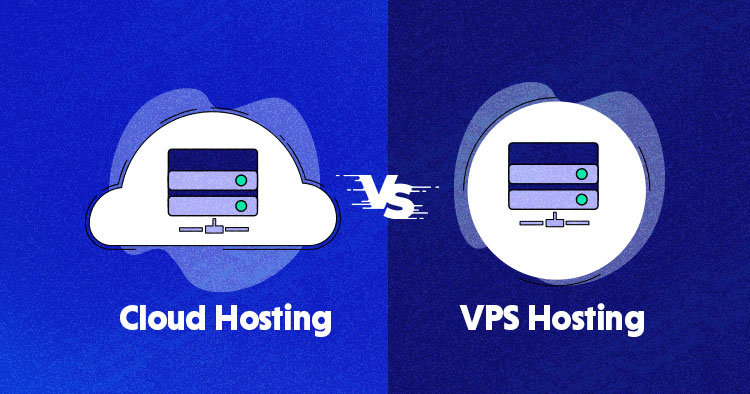VPS Hosting vs Cloud Hosting: A Comprehensive Comparison
In the realm of web hosting, two terms that often come up in discussions are VPS hosting and cloud hosting. Both offer unique advantages and cater to different needs, making it essential to understand the differences between them. In this article, we will delve into the world of VPS hosting vs. cloud hosting, exploring their features, benefits, and use cases. Let’s unravel the intricacies of these hosting solutions to help you make an informed decision for your online presence.
The Evolution of Hosting Services

Before we delve into the specifics of VPS and cloud hosting, it’s crucial to understand the evolution of hosting services. In the early days of the internet, websites were hosted on physical servers that were maintained and operated by individuals or organizations. As the demand for online presence grew, shared hosting emerged as a cost-effective solution where multiple websites shared resources on a single server.
However, shared hosting had its limitations in terms of performance and security, leading to the development of more advanced hosting solutions like VPS and cloud hosting. These technologies revolutionized the hosting industry by offering scalable, reliable, and secure infrastructure for websites and applications.
Understanding VPS Hosting
Virtual Private Server (VPS) hosting is a type of hosting where a physical server is partitioned into multiple virtual servers, each with its own dedicated resources. This virtualization technology allows users to have more control and customization over their server environment compared to shared hosting.
With VPS hosting, users have root access to their virtual server, enabling them to install custom applications, configure settings, and manage resources efficiently. This level of control is beneficial for businesses and individuals who require a higher level of security, performance, and flexibility for their websites or applications.
One of the key advantages of VPS hosting is its scalability. Users can easily upgrade or downgrade their resources based on their requirements, making it a versatile option for growing websites or fluctuating traffic patterns. Additionally, VPS hosting offers better performance and stability compared to shared hosting, as resources are not shared among multiple users.
The Advantages of Cloud Hosting

Cloud hosting, on the other hand, is a scalable hosting solution that relies on a network of virtual servers to distribute resources and handle traffic spikes efficiently. Unlike traditional hosting services, cloud hosting operates on a pay-as-you-go model, allowing users to pay only for the resources they consume.
One of the primary benefits of cloud hosting is its high availability and redundancy. Cloud providers use multiple servers and data centers to ensure that websites and applications remain online even in the event of hardware failures or downtime. This level of reliability makes cloud hosting ideal for mission-critical websites and businesses that require uninterrupted service.
Another advantage of cloud hosting is its scalability and elasticity. Users can easily scale their resources up or down based on demand, making it a cost-effective solution for websites with unpredictable traffic patterns. Additionally, cloud hosting provides built-in redundancy and data backup, minimizing the risk of data loss or service disruptions.
Comparing Performance and Reliability
When it comes to performance and reliability, both VPS hosting and cloud hosting offer significant advantages over traditional hosting solutions. VPS hosting provides dedicated resources and isolated environments for users, resulting in better performance and stability for their websites or applications.
On the other hand, cloud hosting leverages the power of virtualization and distributed computing to ensure high availability and scalability. Cloud providers use advanced technologies like load balancing and auto-scaling to optimize resource utilization and handle traffic spikes effectively.
In terms of reliability, cloud hosting has the edge due to its redundant infrastructure and failover mechanisms. Cloud providers replicate data across multiple servers and locations, reducing the risk of data loss or service interruptions. This level of redundancy makes cloud hosting an attractive option for businesses that cannot afford downtime or data loss.
Security and Data Protection
Security is a critical aspect of web hosting, especially for websites that handle sensitive information or conduct online transactions. Both VPS hosting and cloud hosting offer robust security features to protect users’ data and prevent unauthorized access.
VPS hosting provides users with a dedicated environment and root access, allowing them to implement custom security measures and configurations. Users can install firewalls, SSL certificates, and intrusion detection systems to fortify their server against cyber threats.
Cloud hosting, on the other hand, employs advanced security protocols and encryption techniques to safeguard users’ data in transit and at rest. Cloud providers adhere to industry standards and compliance regulations to ensure the integrity and confidentiality of sensitive information.
Furthermore, cloud hosting offers built-in data redundancy and backups to prevent data loss in case of hardware failures or disasters. Cloud providers store data across multiple servers and geographically dispersed locations, ensuring that users can recover their data quickly and securely.
Cost Considerations and Pricing Models
When it comes to cost considerations, both VPS hosting and cloud hosting offer competitive pricing models that cater to different budgetary requirements. VPS hosting typically involves a fixed monthly fee based on the resources allocated to the user, such as CPU, RAM, storage, and bandwidth.
Cloud hosting, on the other hand, operates on a pay-as-you-go model where users are billed based on their resource consumption. This pricing model provides users with flexibility and cost-efficiency, as they only pay for the resources they use without any upfront commitments.
While VPS hosting may be more cost-effective for users with consistent resource requirements, cloud hosting offers scalability and elasticity that can result in cost savings for websites with fluctuating traffic patterns. Users can scale their resources up or down dynamically, optimizing their costs and maximizing their ROI.
Expert Opinions
According to industry experts, the choice between VPS hosting and cloud hosting depends on the specific needs and requirements of the user. Businesses with predictable traffic patterns and stable resource requirements may find VPS hosting to be a cost-effective and efficient solution.
On the other hand, businesses that prioritize scalability, reliability, and high availability may benefit from cloud hosting’s advanced features and pay-as-you-go pricing model. Cloud hosting is ideal for websites and applications that require on-demand resources and seamless scalability to accommodate growth.
Conclusion
In conclusion, the debate between VPS hosting and cloud hosting ultimately comes down to the unique needs and objectives of the user. While VPS hosting offers control, customization, and cost-effectiveness, cloud hosting provides scalability, reliability, and high availability for mission-critical websites and applications.
Whether you choose VPS hosting or cloud hosting, it’s essential to evaluate your requirements, budget, and long-term goals to make an informed decision. Both hosting solutions have their strengths and weaknesses, so consider factors like performance, security, scalability, and pricing before selecting the right option for your online presence.
As technology continues to evolve and new hosting solutions emerge, it’s crucial to stay informed and adapt to the changing landscape of web hosting. By understanding the differences between VPS hosting and cloud hosting, you can make a strategic decision that aligns with your business objectives and delivers a seamless online experience for your users.




